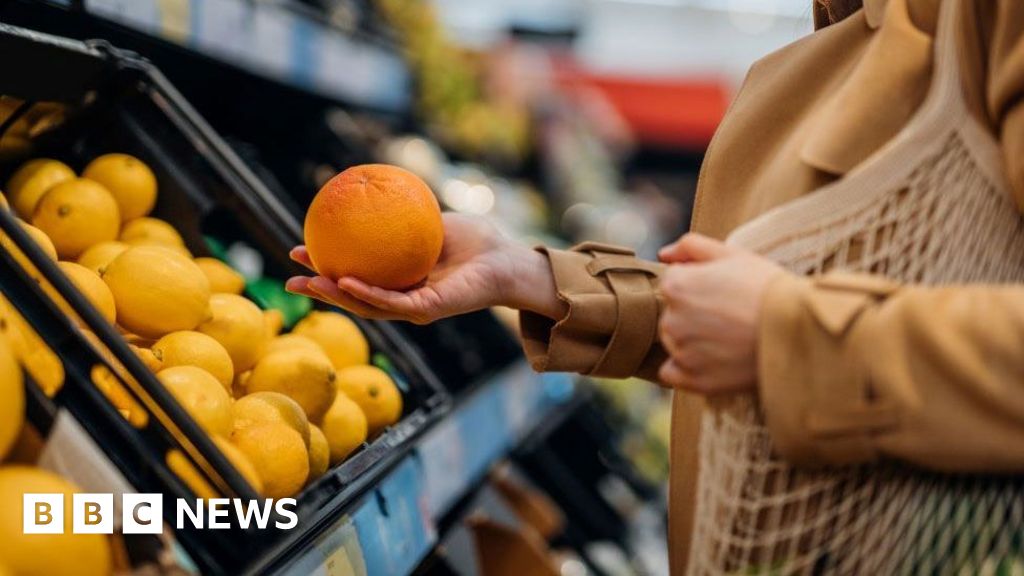- cross-posted to:
- [email protected]
- [email protected]
- [email protected]
- cross-posted to:
- [email protected]
- [email protected]
- [email protected]
Late last year, Emily Johnson took to Reddit to share her frustration with how expensive food in Canada has become.
She fixated on one grocer in particular: Loblaw, the dominant food retailer in Canada, boasting nearly 2,500 stores.
Her Reddit group - named LoblawsIsOutofControl - was filled with photos of grocery items for sale at seemingly egregious prices, like C$40 ($29.36; £23.06) for 1.4 kilograms of chicken.
Soon after, Ms Johnson and others banded together to launch a nation-wide boycott against Loblaw, saying they were fed up with the disparity between rising food prices and record profits.
We started boycotting Loblaws and Shoppers Drug Mart in May like the movement said and haven’t stopped since. We’ve been going out groceries at our local independent markets for produce, meats, fish, cheese, and other goods in bulk and getting the rest from Metro and Jean Coutu pharmacy. Metro aren’t that much better but it’s the lesser of two evils.
Honestly I can say we have saved a lot, especially on the bulk stuff for dry goods like nuts, flour, coffee, cereal and also dish soap, honey and even peanut butter.
I went into superstore and the produce and meat sections were awful.
All the produce was near expiry, the potatoes had eyes growing and were soft, the onions had holes in them. I just left, I couldn’t pay those prices for produce with days left on their life.
Metro was immediately better.
In my case, the Metro I go to has awful vegetables. They’re like you just described. It really depends on the location.
I just assumed it was because of the boycotts and they were sitting out for longer
Loblaws branded stores disappeared from QC years ago. In Québec, Métro is pretty expensive, like IGA or Provigo. The cheapest groceries are Maxi (yeah, it’s Loblaws group) and SuperC (Metro group). But for me, all fruits/vegetable comes from local greengrocers, who also sell various ham/cold cuts and lot of cheese, sometimes for 50% of the price of groceries, and it’s fresh cut. Else for some bulks there’s bulk barn, and Costco, or sometimes even Amazon, a family box size cereal is $10.99 at IGA and the same one is $5.49 on Amazon.
Loblaws, the name, isn’t used in Quebec anymore, no. But their brand stores are very much here.
The whole point is not to just boycott stores that say “Loblaws” on the sign. But to boycott all the chains they own like Shoppers Drug Mart/Pharmaprix, Provigo, Maxi, T&T, as well as No Name, Life and PC brands, etc.
Anything Galen Weston Jr owns.
And don’t forget to boycott his castle in Britain as well.
/s
Fucking hell …
I know, Maxi is part of Loblaws as I wrote, but unfortunately it is the cheapest grocery in QC, but I go more and more at SuperC now.
and telecoms, and transit, and housing, and… theres lots to be angry about lol
Our country is becoming unliveable for anyone who isn’t rich, must be because of immigrants and trans people!! (/s)
I wish people would band together to hate the wealthy instead of minorities.
Most people do not know how to find or use communication platforms that at not operated by “the wealthy.” The platforms they DO know are also geared to keeping users angry and scared to drive up engagement and keep people from leaving.
It’s easier to hate the person different from you that is directly in front of you, than the nebulous concept of some company that is far away. Plus, like the other poster mentioned, it’s easy and proffitable to play on people’s fears.
Support Sasktel, Freedom, Fizz, Videotron over the big 3 telecoms.
unrelated, but does everyone else remember Bob Loblaw’s Law Blog?
oh man can he lob law bombs like it’s nobodies business
Bob Loblaw lobbed law bomb: logged on Bob’s law blog
Thank you. I needed someone to put that all together.
fed up with the disparity between rising food prices and record profits
Well, there is no disparity, in fact, it’s cause and effect
I believe the disparity she’s referring to is that food prices should be falling as a result of corporate pricing structure adjustments to reflect their record profits. But of course that would contradict the malignant greed of late stage capitalism.
Indeed, I believe the correct meaning to be the one you stated. It was just a joke in choosing an unintended meaning of the word, don’t take my comment too seriously
No one has explained to me yet how a Loblaws boycott helps stop Sobeys and Pattinson from doing the same thing.
One person claimed it would be rolling boycotts, but I haven’t heard peep about boycotting the others.
Loblaws owns a lot of other brands and are quite dominent, if you can get them to drop prices then Sobeys will have to follow suit. Rolling boycott doesn’t do much because if you boucott Sobeys in the next month people will shop back at Loblaws, best plan is introducing Canadians to the true independent local grocer/bakery/butcher during the boycott and continuing to shop there. Another issue is Loblaws owns a commercial property landlord type company and 65% of their tennancy is Loblaws stores; which has anticompetitive clauses that disallow smaller grocers to move into land rental agreements where Loblaws doesn’t want competition.
I actually think the boycotts and sustained bad press about Loblaws might be helping more than this grocery code of conduct, whatever it’s supposedly doing.
But good news, everyone!
Amendments were made in December to the Competition Act that should help, eventually.
Here are some details you never asked for but I’ll post anyway.
I read a good blog post about it on Lemmy somewhere, but I can’t find it now unfortunately.
The gist is, from memory:
- the act was originally written to protect the Canadian economy from being overtaken by foreign competition (I.e. US especially).
- it would favour Canadian companies provided that it would benefit the country economically overall, regardless of the harms to Canadians in terms of the lack of competition (artificially high prices, lack of coverage, access, etc).
- these companies were protected from civil suits for those harms.
- the result was the best possible conditions for the consolidation of market share to the very few Canadian companies and too much cost or difficulty for foreign companies to bother competing with. Very often, these became family dynasties (The Westons, Rogerses, Sobeys’ owners - Irving?, etc).
But some of the changes in December basically alter those considerations about harms and these companies are legally exposed to civil suits if the harms are realized. This could help.
In some ways, I suppose we should be grateful for Loblaws’ exceptional greed of late because maybe nothing would change if we weren’t angry and focused enough on these problems.
I see this as a very long long overdue reaction to the telecom and grocery chain debacles. It’s hard to know for certain because these commercial dynasties are very tight with the political dynasties. It seems like they don’t really want anything to change. Just posturing for the cameras and then let things go back to “normal”.
Take the Internet, since its inception in Canada. One of the highest prices in the world. Same with wireless. Lately, the CRTC has helped kill almost all independent ISPs through long drawn out reviews and delay tactics on wholesale fiber rates, even after the lobbyist as Head was replaced with someone less duplicitous; someone who started with the mandate to focus policy on consumer benefits and protections as opposed to the industry. Still going on.
And of course, allowing Rogers to buy Shaw and Freedom Mobile. Selling off to videotron doesn’t help as much as a viable fourth player would have.
And now it feels like they’re sabre rattling about grocery regulations, encouraging Loblaws to drop prices until we forget about it but leave the door open for these problems to happen again. Then run around again trying to woo a foreign company/investment to come to Canada just like Wind Mobile, fail due to favouritism of Canadian incumbent companies and get bought and sold in 10-20 years. I don’t blame these foreign companies for avoiding Canada. Too risky.
The government is very conflicted right now it seems. But I’m hoping the changes to the act will turn this around for future industry decisions.
Canada’s federal innovation minister has since taken several overseas trips to woo an international grocer to set up shop in Canada, in an attempt to increase competition and therefore drive down food prices.
I get the feeling that Canada’s solution to all the monopolies is to invite foreign companies. Or maybe the Government can start enforcing the Competition Act.
Didn’t Loblaws get caught up in price fixing recently?
The billionaire grocery mafia gougers are out of control in Canada.
This is the best summary I could come up with:
Canada is searching for an international grocer to enter its domestic market, after years of anger from shoppers over high food prices, much of it directed at one of the big players.
But would an Aldi or a Lidl solve the problem?Late last year, Emily Johnson took to Reddit to share her frustration with how expensive food in Canada has become.She fixated on one grocer in particular: Loblaw, the dominant food retailer in Canada, boasting nearly 2,500 stores.Her Reddit group - named LoblawsIsOutofControl - was filled with photos of grocery items for sale at seemingly egregious prices, like C$40 ($29.36; £23.06) for 1.4 kilograms of chicken.Soon after, Ms Johnson and others banded together to launch a nation-wide boycott against Loblaw, saying they were fed up with the disparity between rising food prices and record profits.As anger grew, the grocer’s former president Galen Weston, who has defended the profits, became the de facto face of food inflation in Canada, thanks to his regular appearances in Loblaw commercials and his annual reported salary of C$8.4m.Some even began selling T-shirts featuring a spoof “Roblaw$” logo, which were met with copyright infringement complaints from the grocer.The boycott, which began in May and is set to continue indefinitely, has since sparked a national conversation on how groceries in Canada are priced, and why a company like Loblaw continues to be profitable as more Canadians struggle to afford food.It has also ignited political pressure and scrutiny on the grocery practices of not just Loblaw, but other major grocers in the country.“Groceries did not used to be such an issue but the prices have skyrocketed this past year so we’re going without anything frivolous,” Terra Suffel, a 49-year-old single mother of two living in Toronto, told the BBC.
Now it barely covers lunch ingredients and much-needed pantry items.“We can’t really afford much meat and our main protein is now eggs,” she said, adding that she, too, is boycotting Loblaw.In response to frustrated Canadians like her, Canada’s federal innovation minister has since taken several overseas trips to woo an international grocer to set up shop in Canada, in an attempt to increase competition and therefore drive down food prices.But experts say that any foreign grocer looking to enter Canada’s market faces an uphill battle to distinguish itself from existing players, and that the country’s unaffordability crisis may require a more complex fix.Loblaw has responded to the boycott by saying they remain committed to be the “retailer of choice” for Canadians.In a statement to the BBC, the company added that it was doing what it could to fight inflation and plans on opening more discount stores to make affordable food more accessible.
And while Walmart is by far the most popular chain across the country, there are more than a dozen other grocers meaningfully competing with it.Similarly, the UK’s market is also diverse, with a total of 14 businesses turning over more than £1bn in groceries sales per year.Prof LeBel said the Loblaw boycott is a signal from Canadians who are fed-up with the lack of choice and the country’s grocery behemoths, who lack an incentive to meaningfully tackle rising food costs.
It is also the UK’s fourth largest supermarket.Its chief competitor Lidl has a footprint in the UK and the US as well, though a smaller one than Aldi.Despite their popularity in other countries, retail experts say entering the Canadian market comes with its own unique set of challenges.“The classic mistake all foreign retailers make when coming to Canada is that they think it is the 51st US state,” said Amarinder Singh, a senior director at consulting firm Kantar.In reality, Canadian shoppers are very different, he said.Their needs vary regionally, he said, whether they live in Atlantic Canada or in British Columbia, or whether they call a major metropolitan city like Toronto home.
Canada is also a highly multicultural country with 20% born elsewhere and a national grocer must target them to find success, Mr Singh said.Another factor to consider is that Loblaw’s strong loyalty points programme covers 40% of Canada’s entire population.“The issue is how you engage the shoppers, and how you steal the share from the Loblaws and Sobeys and Metros of the world, who have such a strong grasp on this market,” said Mr Singh.Some have said the minister’s international tour is a bit of political theatre ahead of a consequential election for Canadians where the ruling Liberal Party is significantly lagging in the polls.“Going after a big player, you have meetings, photo ops - it looks like you’re doing something,” Prof LeBel said.A spokesperson from Minister Champagne’s office, Riyadh Nazerally, confirmed to the BBC that he has spoken to foreign retailers about “possible investments in Canada”, but no further details.Canada is working on other measures, like reforming its Competition Act to make it more friendly to new entrants, he added.Prof LeBel said he believes the government should also focus on building up already-existing regional players and small, local grocers.Experts have said that the impact of the boycott on Loblaw is likely limited.
The original article contains 1,208 words, the summary contains 838 words. Saved 31%. I’m a bot and I’m open source!









